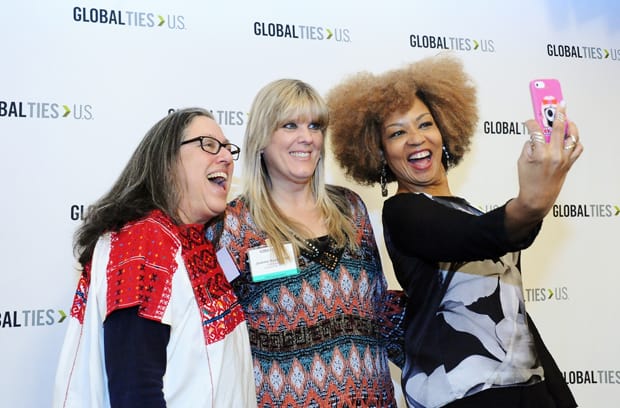
WASHINGTON, D.C. – A Latino congressman from California, a respected pollster and Brazil’s top diplomat here were among speakers at the 2015 Latin America Dialogue recently held at the Organization of American States’ headquarters.
Sponsored by GlobalTies U.S., the Feb. 4 event – “Strengthening Relations in the Western Hemisphere through Exchange” – attracted about 350 people. Coinciding with the 75th anniversary of the U.S. State Department’s International Visitor Leadership Program, its focus was the role public diplomacy plays in U.S. foreign policy.
OAS Secretary General José Miguel Insulza, whose term of office ends this year after a decade leading the 34-nation body, opened the half-day event along with James R. Jones, former U.S. ambassador to Mexico and now chairman of ManattJones Global Strategies, a Washington consulting firm.
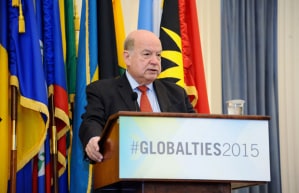
Other keynote speakers included Thomas R. Pickering, former undersecretary for political affairs; John D. Feeley, principal deputy assistant secretary in the State Department’s Bureau of Western Hemisphere Affairs; Rep. Tony Cárdenas (D-Calif.); former U.S. Commerce Secretary Carlos Gutiérrez; David Decker, president of Ohio’s Franklin University; Rep. Joaquín Castro (D-Texas) and Ernesto Henrique Fraga Araújo, chargé d’affaires at the Brazilian Embassy in Washington.
“What this administration wants is a Western Hemisphere that is democratic, prosperous, middle-class and able to use the fruits of its prosperity and growth for all its citizens, not just a select few,” said Feeley, whose overseas assignments include Mexico City, Santo Domingo and Bogotá.
But continuing violence – especially in Central America – is eating away at that prosperity, even in full-fledged democracies.
“Citizen security undergirds any society’s potential for happiness,” he said. “If you’re afraid to go out at night, if your small business is being extorted, you’re not happy. Colombia has shown us how to handle this, but still has a long way to go.”
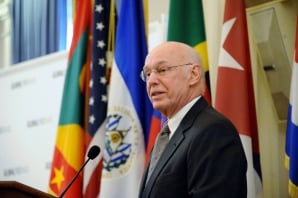
So does the U.S., he added, “with its Staten Island chokeholds and Fergusons” – a reference to two of the most glaring recent incidents of police brutality against African Americans.
Jon Clifton, managing director of Gallup World Poll, said measurements such as per-capita GDP and unemployment are often poor indicators of true happiness. And even though incomes have risen dramatically, Latin Americans are no happier than in the past.
“The Middle East is No. 1 in the world for negative emotions, but No. 2 is Latin America,” said Clifton, whose company’s Gallup World Poll covers 160 countries representing 98 percent of the world’s adult population. “In Latin America, there are very high negative emotions, driven by things like corruption. We can see it in our database. That is one of the single biggest drivers of pain and worry.”
Cárdenas, who represents California’s 29th Congressional District, said six million U.S. jobs rely on trade with Mexico, and that products manufactured in Mexico contain four times as many U.S. components as those made in China. In addition, wages are 37 percent higher in export-related industries than in the rest of the Mexican economy.
“The United States and all countries south of us should and need to do business with each other,” Cárdenas told his audience. “We should pay attention to each other. It’s in our own interest, and I dare say, there’s no need to go to China when you have Mexico, Costa Rica, Colombia and Chile. There are so many opportunities.”
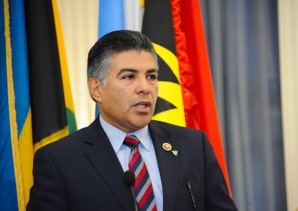
Cárdenas, who was who was first elected to the California State Assembly in 1996, went on to serve three terms in that body and was later elected to the Los Angeles City Council. After 16 years in public office, he made history by becoming the first Latino elected to represent the San Fernando Valley as a member of Congress.
“I believe that in our subliminal psyche, it became uncool to do business with Latinos. Growing up, people tried to convince me it was not cool to be a Latino. And I wasn’t the only one,” he recalled. “But because I was able to overcome those lies, it wasn’t until I was 31 that a Latino activist hoodwinked me into running for office.”
Cárdenas said boosting trade with Latin America is among his top priorities.
“I want California to be a hub for continued innovation with Latin America. As a Latino former business owner, I want to see Latinos succeed not only in my community but throughout the hemisphere,” he said, complaining that many in the U.S. are basically “ignoring” the 30-plus countries to its south – even as China grabs all the attention.
“When I was on the city council for 10 years, I had business people come up to me and say, ‘I want to go to China.’ Then I’d ask them why China, and they had absolutely no idea,” said Cárdenas. “In this country, for too many businesses it became cool and sexy to go to China. Well, I’ve got to say, Sofia Vergara is from Colombia, and she’s pretty cool and sexy.”
Cárdenas vowed that as long as he’s in Congress his mission will be “to make dreams come true for Americans and all the people to the south of us. We have the resources. We can and should be the dominant region of the world, if we do what is right.”
Watch Tico Times correspondent Larry Luxner moderate a panel on Cuba, at 2:24:52:
One thing that’s not right, said Pickering, is the continued detention of terrorists – real and suspected – at the U.S. Naval Base at Guantánamo Bay, Cuba. Pickering, a former U.S. ambassador to Russia, India, Israel, El Salvador, Nigeria and Jordan, said Guantánamo should be turned from a prison into an opportunity.
“That opportunity is to create a first-class graduate institution focused on all of the subjects of interest to the hemisphere – economy, business development, health and education. Why not begin to think about that now?” he said. “I’ve often thought it’s time to close Gitmo anyway. We can all benefit from and be proud of this. Why not make it a center for the long-term future of the world?”
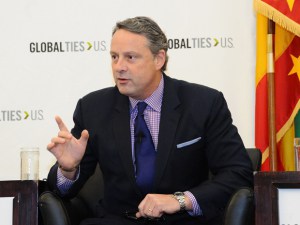
Cuba, in fact, was a focus of the event, given that the GlobalTies dialogue took place only seven weeks after President Barack Obama declared that the United States would re-establish diplomatic ties with Cuba after more than half a century of hostility.
Asked about the announcement, the State Department’s Feeley said it “does not represent a strategic shift” in thinking, contrary to what many observers are saying.
“The end state of our Cuba policy has always been about promoting the legitimate, democratic desires of the Cuban people, who have suffered from a totalitarian regime that does not afford its people the democratic rights every other country in this hemisphere affords its people. What’s changed is the tactic of diplomatic isolation.”
Feeley added: “The re-establishment of diplomatic relations is nothing more than the very first step in the process called normalization. We all look forward to that day when a democratic Cuba is welcomed back into this hall, but we don’t have that yet. We are taking steps to get in that direction, but it will be very slow and tortuous.”





